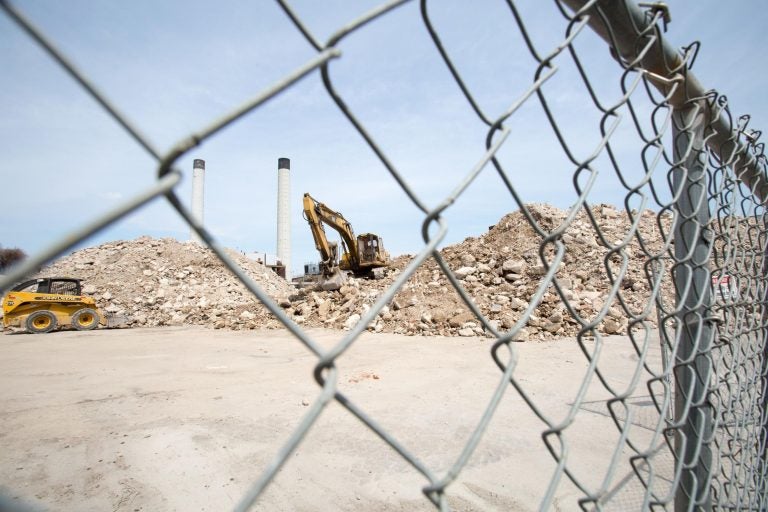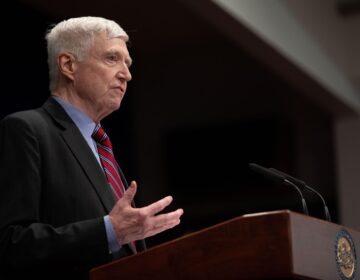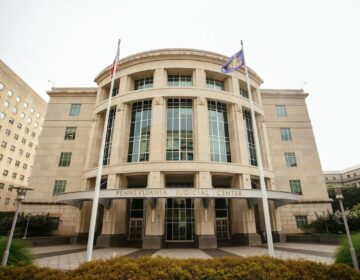FBI probe of massive Pa. pension fund seeks evidence of kickbacks or bribery
Subpoenas reviewed by Spotlight PA and The Philadelphia Inquirer lay bare the scope of the federal investigation into Pennsylvania's $64 billion public school pension fund.

Federal authorities are demanding records concerning a series of Harrisburg buildings and lots bought by PSERS, including the former Patriot-News building at 1812 Market St., shown here after demolition. (Kalim A. Bhatti for The Inquirer)
This story originally appeared on Spotlight PA.
___
Federal prosecutors investigating Pennsylvania’s $64 billion public school pension fund are looking for evidence of kickbacks or bribery as they explore why the plan exaggerated investment returns and spent heavily to amass real estate in Harrisburg.
Subpoenas reviewed by Spotlight PA and The Philadelphia Inquirer demand information from the fund itself, its executive director, and at least three other senior officials. The documents lay bare the scope of the probe and reveal that prosecutors and the FBI are investigating possible “honest services” fraud and wire fraud.
Under a key 2010 U.S. Supreme Court ruling, criminal-law experts say, federal prosecutors must have proof of illegal payments to charge state officials with the crime of not providing honest service. Wire fraud involves using a phone or email to commit crimes.
The subpoenas naming individuals and reviewed by the news organizations seek grand jury testimony from fund executive director Glen Grell, chief financial officer Brian Carl, deputy chief investment officer Thomas Bauer, and chief auditing officer Mei Gentry. No one, including those served with subpoenas, has been accused of wrongdoing.
The subpoenas, dated March 24, were signed by Assistant U.S. Attorney Michelle Morgan, a 20-year Justice Department prosecutor appointed last fall to head the elite public corruption unit of the U.S. Attorney’s office in Philadelphia.
FBI agents have also been carrying out interviews, documents show, in the probe of PSERS, the Pennsylvania Public School Employees’ Retirement System. The pension fund is one of the nation’s largest. Every year, it sends more than $6 billion in pension checks to 265,000 retired teachers and other former educators.
The investigation is also probably “benefiting from the cooperation of an insider,” a defense lawyer has told PSERS board.
Asked about the probe, Evelyn Williams, a spokesperson for the pension fund, said it would have no comment, staying silent to protect the secrecy of its own internal inquiry and the federal one. The U.S. Attorney’s office has also declined to discuss the probe.
PSERS has hired three law firms to represent the agency and its board and to conduct an internal investigation. One Philadelphia firm, Morgan Lewis, quickly warned the fund that its members could face “catastrophic” consequences, including the immediate taxation of all future benefits, unless it corrected errors in its performance results.
Another firm, Pillsbury, of Washington, D.C., was the one that warned the fund about the possible informant within its ranks. It did so in a pitch letter to the board trying to land work.
Pillsbury attorney William M. Sullivan Jr., head of its corporate investigations and white-collar defense practice, advised the panel that the federal investigation could pose “real and significant risks for PSERS board members.”
Among other issues, he said the FBI was pursuing a possible cover-up — or, as he put it, “potential concealment of material information.”
On the other hand, Sullivan, a former federal prosecutor, said he had been “uniquely successful … in persuading government and regulatory authorities to decline to pursue criminal investigations.” He also promised Pillsbury could shield board members “from aggressive criminal investigative scrutiny.”
He said the fund needed to cooperate with law enforcement, conduct its own “credible” inquiry — and “promptly” interview witnesses “to learn what they may have told the FBI.” Sullivan, who briefed the board Wednesday night in a closed session, declined comment for this article.
PSERS hired his firm, along with Morgan Lewis and Womble Bond Dickinson, a firm with offices in North Carolina and London. Morgan Lewis is being paid up to $367,500. Fees for Pillsbury and Womble aren’t yet public, but the lead attorney for Morgan Lewis charges $1,210 an hour — a discounted rate, according to its public contract with PSERS.
Some fund staff have also reportedly hired private lawyers.
As the Inquirer has previously reported, prosecutors are digging into two issues — the board’s vote in December to adopt a false, overstated figure for its investment performance, and its $5 million appropriation in 2019 to buy real estate near its headquarters in the state capital. It’s unclear whether the two issues are related to one another.
Jackie Lutz, the retirement system’s chief counsel, told PSERS employees on April 8 to safeguard all documents or computerized information related to those two matters The subpoenas state explicitly that those are the two issues under investigation.
Her instruction came more than two weeks after federal authorities demanded those records. PSERS officials would not comment on that delay.
The board’s vote in December was highly significant because it endorsed a number for fund growth just high enough to spare 100,000 working teachers from having to pay more into the fund. Under state law, such payments are tied to performance results. Instead, only taxpayers were to face an increase.
Executive director Grell and James Grossman, the chief of the plan’s 50-member investment unit, insisted last year that the number was accurate, even though then-State Treasurer Joe Torsella, a fierce critic of the fund’s management, questioned why the fund was retroactively improving its results.
But this spring, the panel disavowed the number, redid the calculation, and adopted a new higher figure — one that triggered high payments into the plan by newer teachers and school employees. The bigger bite fort them and taxpayers takes effect July 1.
Fund documents show that the board is now pondering such questions as whether the botched number was not simply a mistake, but was manipulated by staff or consultants “to achieve a certain outcome” and whether some officials knew about the flawed calculation but kept it secret.
Another issue: was an outside consultant, ACA Group of New York, that was hired to check the calculation deliberately handcuffed in its review?
Before the board reversal, pension officials said repeatedly in official documents that ACA verified the number. ACA then pushed back, insisting that it was hired only to spot-check math, not to affirm the figure.
The grand jury subpoenas demand that the plan provide “a roster of the individuals involved with the calculation,” as well as “final versions, draft versions and revisions” of key documents used to reach it. It also seeks material given the fund by three financial consulting firms who played roles in the calculation debate.
The subpoenas also demanded records concerning a series of Harrisburg buildings and lots bought by PSERS. The subpoenas identified them as the former Patriot-News building at 812 Market St. and seven related lots, a former state-owned building at 909 Market St., a building at 1000 Market St., and three parking lots on 10th Street. The real estate is clustered about a mile from the PSERS office.
The fund bought the properties between 2017 and 2020 for a total of $2.2 million. It spent another $785,00 last year to buy two more lots on Market Street, though those weren’t named in the subpoenas. Those last purchases were approved in a session closed to the public and media.
In all, the board approved $13.5 million to buy and develop the properties, including the 2019 installment of $5 million cited in the subpoenas. While the fund has demolished the old Patriot-News buildings and spent money on maintenance, total spending is unknown.
Though PSERS has said little about the purchases, internal documents say that it planned to come up with a master plan for the site. It’s unclear if that ever happened.
In addition, the documents say PSERS’ legal staff had negotiated development agreements for the properties. In any event, such agreements or a master plan have never been made public.
While the federal crime of bribery generally can only be brought against federal officials, U.S. prosecutors pursuing state officials can get around this by charging them with honest-services fraud. The law defines this as denying people the “intangible right of honest services.”
Up until a decade ago, federal prosecutors seeking to charge corrupt state officials with honest services fraud could do so when a suspect had a hidden conflict of interest, even if no illegal payments could be shown.
However, the Supreme Court, concerned about federal overreach and a nebulous statute, has stricken conflicts of interest as grounds for such a case, according to experts including Michael A. Schwartz, a former leading federal anti-corruption prosecutor in Philadelphia who now heads the white-collar and government investigations practice at the Troutman Pepper law firm.
The high court ruling involved an executive of the discredited energy firm Enron. Honest services cases can be brought against officials and private executives.
 Spotlight PA is an independent, non-partisan newsroom powered by The Philadelphia Inquirer in partnership with PennLive/The Patriot-News, TribLIVE/Pittsburgh Tribune-Review, and WITF Public Media.
Spotlight PA is an independent, non-partisan newsroom powered by The Philadelphia Inquirer in partnership with PennLive/The Patriot-News, TribLIVE/Pittsburgh Tribune-Review, and WITF Public Media.
WHYY is your source for fact-based, in-depth journalism and information. As a nonprofit organization, we rely on financial support from readers like you. Please give today.






